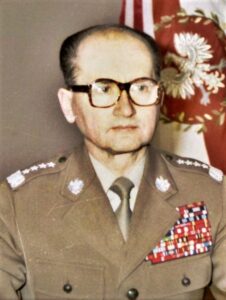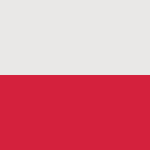Wojciech Jaruzelski
1923-2014
Soldier and leader of the military junta in Poland 1981-1989. President 1989-1990.
Jaruzelski … is probably just as difficult to write about as Wałęsa. Born in 1923. His grandfather was part of an uprising against Russian rule in 1863 and was sent to Siberia for 8 years for his participation. His father fought in the war against Russia in 1920. Before World War II, Wojciech was a member of some patriotic organisations and in 1941, like many other Poles, he was sent to Siberia, where he developed snow blindness that affected his eyes for the rest of his life.
Soviet officer during World War II
In 1943, he was enrolled as a Soviet officer trainee and over the next two years he was promoted during the fighting in Europe. With the Soviet army in Berlin 1945. After the war, he helped rebuild the Polish army, becoming a colonel in 1953 and a brigadier general in 1956. In 1965, he became Chief of the Polish General Staff, but clearly with a strong conviction about the necessary co-operation with the Soviet Union. In 1968, Jaruzelski became Minister of Defence, only leaving this post when he became head of the military dictatorship in 1983.
Soldier
In my opinion, Jaruzelski was first and foremost a soldier, and was deeply influenced by having started his career and advancement in Soviet military units. He also became convinced of the need for close co-operation with Russia and saw the world as divided between East and West – just as many other people did at the time. And Poland was in his view placed in the East.
In 1970, Jaruzelski was probably the main person responsible for deploying the army against striking workers in Poland.
State of emergency
Alongside his military career, Jaruzelski made a career in the Communist Party. After breaking free from the 1970s leader Gierek, Jaruzelski became Prime Minister in 1981, and in December of the same year he was the driving force behind the implementation of martial law, which effectively turned Poland into a military dictatorship for the next 8 years.
The introduction of martial law is one of the things that has divided Poles over the years – either as a necessity to avoid a Soviet invasion, thus sparing Poland a bloodbath, or alternatively, as a cementing of the Communist Party and the Soviet Union’s position of power in Poland. It’s a discussion I have a personal opinion on, but the opinions are so sharply drawn that I’ll refrain from giving it here. I could easily be wrong.

Reforms
In the wake of Gorbachev’s rise to power in the Soviet Union, Poland sought to implement political reforms in the late 1980s, but was paralysed by the inability to repay foreign borrowing and constant strikes. In light of this, Jaruzelski implemented an agreement with Solidarity and Lech Wałęsa called the Roundtable Talks. The name was supposed to refer to a broad agreement among all sides of Polish society, but in reality, the intention was to include Solidarity in the government and give them and Lech Wałęsa co-responsibility for the continued development of society, without overthrowing the political system (communism) or co-operation with the Soviet Union.
Roundtable discussions
The elections following the roundtable agreements resulted in the collapse of the communist system fairly quickly, but in the meantime, Jaruzelski was elected president in accordance with the agreements. Jaruzelski supported the reforms implemented during his presidency, but under political pressure, he himself drafted a proposal for an elected president, which resulted in Lech Wałęsa taking office in December 1990.
Protests
Until his death in 2014, there have been regular protests against Jaruzelski and calls for a judicial settlement for the state of emergency and the military’s attack on striking workers in 1970. However, to this day he has a number of supporters who believe that he acted primarily out of a desire to avoid Soviet interference in Polish affairs. Criminal proceedings were also initiated against him, but these were suspended in 2011 due to the general’s poor health.
Please send an email to m@hardenfelt.pl if you would like an English-speaking tour guide to show you the most important places in Warsaw.
